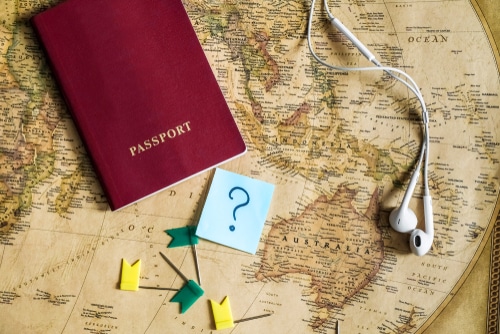More Americans than ever are deciding to move abroad, driven by professional ambitions, the desire for slower-paced retirement, the chance to study abroad, or simply the pursuit of adventure. While uprooting your life and starting fresh in a new country can feel overwhelming, with the right preparation and guidance, an international move is entirely achievable.
In this Remitly guide, you’ll find plenty of helpful tips how to move to another country from the U.S. From researching your destination to navigating visas, healthcare, finances, and cultural integration, we’ll help you find a clear path forward and the confidence to start your journey.
Why move abroad?
U.S. citizens relocate for many reasons: better job markets, lower living costs, improved healthcare, or personal growth. About 5.5 million Americans live abroad, enjoying everything from scenic coastal towns in Portugal to bustling cities in Southeast Asia.
No matter your reason, it’s important to remember: you’re not alone. A thriving global community of U.S. expats exists, and you can be part of it.
Research your new country
Choosing where to go is one of the most exciting and crucial steps in the relocation process. Your ideal destination will depend on your personal goals and lifestyle preferences. Take time to research carefully. Here are key factors to consider:
Cost of living
Compare housing, groceries, transportation, and healthcare costs. Countries like Portugal or Costa Rica offer a lower cost of living, while others like the U.K. or Japan may be just as or even more expensive. Numbeo offers user-generated cost-of-living comparisons by country and city.
Safety and stability
Consider crime rates, healthcare access, infrastructure, and political stability. Use the U.S. Department of State’s travel advisories and read recent expat reports or local news for real-world insight.
Healthcare quality
Research whether your destination has universal healthcare, if expats can access it, and whether you’ll need private insurance. This is especially important for retirees or those with ongoing health needs.

Jobs and visas
If you’re moving for work, explore local job markets and visa requirements. Some countries have skill shortages and offer fast-track visa options, while others have strict labor laws and may favor hiring citizens first. Consult the official immigration sites for accurate, up-to-date info.
Cultural and language
Think beyond the tourist experience. Consider how comfortable you’ll feel adapting to local customs, languages, and social expectations.
Transportation and infrastructure
Prioritize what matters most to you: walkability, public transit, or a car-friendly setup. Check how easy it is to get around, both within the country and regionally.
Climate
Don’t underestimate how the weather can affect your daily life. Choose a climate that fits your lifestyle, whether you prefer sunshine, snow, or something in between.
Cultural dynamics
Small cultural differences can impact your comfort and integration. Research social customs, etiquette, holidays, and work culture to ease your transition and avoid unintentional faux pas.
For real insights, check out ExpatExchange, InterNations, Facebook expat groups, or Reddit threads for tips on housing, visas, and everyday life from people already living there.
Gather the necessary paperwork
Once you’ve chosen your destination, it’s time to tackle the paperwork. Starting early can save time and stress later.
While each country has unique requirements depending on your reason for moving, most expats moving from the U.S. will need these core documents:
- Valid passport: Must have at least six months of validity beyond your arrival date.
- Visa: Visas vary widely depending on your destination and purpose. Be sure to follow the requirements and application steps exactly.
- Work permits: If you plan to move for work, you’ll likely need a work permit in addition to a visa. Some countries offer freelance or digital nomad visas.
- Birth/marriage certificates: Certified copies are often required for residency applications, enrolling children in school, or setting up local accounts.
- Medical records and immunization history: Required for long-term stays and healthcare access. You may also need to have these translated into the local language.
- School transcripts: If you’re studying abroad or enrolling children in school, you’ll likely need transcripts, diplomas, and possibly standardized test results. These may require translations or apostilles.
- Background check: Often required for visas or residency applications. Processing times can take several weeks, so request this early from the FBI or your local police department.
Stay organized by creating a dedicated digital folder for all your documents. Use a checklist to track what’s needed and set calendar reminders for key deadlines and renewals.

Financial planning and budgeting for your move
Relocating internationally can be expensive but manageable with good financial planning. Expected costs include:
- Flight and baggage fees
- Shipping costs for personal belongings
- Initial housing costs
- Visas and legal fees
- Vaccinations required for visas
- Travel insurance
- Emergency funds
Managing money abroad
Once abroad, you’ll also need to manage finances between countries. Consider:
- Opening a local bank account for easier bill payment and salary deposits.
- Using the Remitly app to securely transfer money between countries.
- Informing your U.S. bank and credit card companies about your move to avoid frozen accounts.
- Monitoring exchange rates to transfer money when rates are favorable.
Learn about healthcare and insurance options
Some countries offer public healthcare systems that cover residents at little to no cost. Others operate more privately, requiring international health insurance for expats.
Choosing the right insurance
Many visas require proof of health insurance before approval. Even when it’s optional, having international coverage is strongly advised, especially in the early months.
Your options include:
- Short-term expat insurance (Cigna Global, IMG Global)
- Comprehensive long-term plans
- Local insurance providers, which may be cheaper once you’re settled
- Employer-sponsored plans (if moving for work)
Make sure the plan you choose includes emergency coverage, hospitalization, routine care, prescriptions, and evacuation or repatriation (especially in remote areas).

Managing prescriptions and pre-existing conditions
If you take regular medication:
- Before departure, ask your doctor for a long-term supply. Some insurers allow a 90-day refill.
- Get prescriptions translated into the local language if needed.
- Check if your medications are legal and available in your destination. Some common meds are restricted abroad.
Housing: renting vs. buying
Most expats start by renting, especially in the first year. It offers more flexibility and lets you get a feel for different neighborhoods before committing long-term. However, if you are staying long-term and want stability, buying is also an option.
Renting tips:
- Use local real estate platforms, classifieds, or social media housing groups.
- Learn tenant laws, including notice periods, security deposits, and renters’ rights.
- Ask for translated contracts or work with a bilingual real estate agent or lawyer.
- Watch out for scams. Never send money without verifying the property and the landlord.
Buying considerations:
- Research property ownership laws for foreigners. In some countries, non-citizens face restrictions on land ownership or may require government approval.
- Work with a local notary or real estate attorney.
- Be aware of added costs like transfer taxes, notarial fees, and maintenance charges.
If you want time to explore neighborhoods before committing, short-term rentals like Airbnb or temporary housing platforms can be a smart choice to give yourself flexibility.

Understanding legalities and residency
To legally stay in your new country, you’ll likely need to obtain residency status. Common steps include:
- Registering with the local government (often required within a set number of days after arrival)
- Applying for a temporary or permanent residency permit
- Submitting background checks
- Providing proof of income, employment, or family ties
- Enrolling in local services like healthcare, education (for children), or with tax authorities
Entry visas don’t always allow long-term stays, so be sure to apply for residency promptly after arrival.
Stay compliant with U.S. tax obligations
U.S. citizens are still required to file annual U.S. tax returns, regardless of where they live or work. Here are the key requirements:
- File an annual U.S. federal tax return every year. This applies even if your income was earned overseas.
- Report foreign bank accounts if the balance exceeds $10,000 at any time during the year by filing a Report of Foreign Bank and Financial Accounts (FBAR).
- Understand the Foreign Earned Income Exclusion (FEIE), which allows you to exclude a portion of your foreign-earned income from U.S. taxation.
Tax rules get complicated when two countries are involved. A qualified tax advisor familiar with international laws or cross-border taxation can help ensure you stay compliant in both countries.
Moving belongings and shipping logistics
Decide early what to bring, and use this opportunity to downsize.
Options for transporting your belongings include:
- International shipping companies: Ideal for large moves or whole-house relocations.
- Freight forwarders: Useful if you’re moving boxes or furniture but don’t need full-service packing.
- Luggage shipping services: Companies like Send My Bag, Luggage Forward, and My Baggage let you ship suitcases or boxes door-to-door.
- Extra baggage fees: You can often prepay for excess luggage on international flights, which works well for smaller moves or temporary relocations.

Customs regulations
Customs regulations differ by country, and some items may be restricted or taxed heavily. Be sure to:
- Research customs regulations in your destination country thoroughly
- Understand what items are restricted (certain food items, electronics, luxury goods)
- Label boxes clearly and number them for easy tracking
- Create a detailed inventory list, including values and descriptions, in case of inspection or insurance claims
For smaller or temporary moves, consider storing items in the U.S. until you decide what’s needed. You can access them later or ship items after you’re more settled in and know what you truly need.
Building a support network abroad
Moving to a new country is about more than logistics—it’s also about creating a fulfilling life. Having a support system can make the difference in your emotional well-being and overall experience.
Connect with other expats
Other expats have been in your shoes and can offer practical advice and support. Here are a few ways to connect:
- Join expat communities on Facebook, InterNations, or Meetup
- Attend local events, networking nights, or language exchanges
- Get involved in hobby or interest-based groups like cooking or hiking
Build local relationships
While expats provide a valuable safety net, making local friends can make your new country feel like home. Here are a few tips to help:
- Learn the language. Use a language app, download Google Translate, get a tutor, or enroll in a local class.
- Explore your neighborhood, attend local festivals, or volunteer.
- Start small. Greet neighbors, chat at the grocery store, or attend community events. A little goes a long way.
Stay connected with loved ones back home
Staying connected with friends and family back home can help ease homesickness. Use WhatsApp for free calls, Zoom or FaceTime for video chat, and group chats or shared photo albums to feel part of day-to-day life.
Consider setting a routine to help you stay emotionally close despite the distance.
Ready to start your next chapter abroad?
Moving to another country from the U.S. is a big step, but with the right guidance and preparation, it’s more than possible.
From choosing the right destination to securing visas, arranging healthcare, budgeting your move, and building a new life, each step brings you closer to your international dream. While challenges are inevitable, the rewards far outweigh the difficulties.
Are you ready to start your next chapter abroad? Take that first step. Research a country. Join an expat forum. Create a moving checklist. Your new life is waiting.
Helpful resources
- OECD Better Life Index: Compare countries based on lifestyle factors like health, education, and work-life balance.
- U.S. Department of State: Check country-specific entry, visa, and safety info.
- Visa HQ: Check visa requirements and apply online.
- IRS: Tax obligations for U.S. Citizens and resident aliens living abroad.
- Greenback Expat Tax Services: Tax filing help for Americans living abroad.
FAQs
How long does it take to get a visa?
Visa processing times vary by country and visa type. It can take anywhere from a few weeks to several months. To avoid delays, start gathering documents and applying as early as possible.
Do I have to pay U.S. taxes if I live abroad?
Yes, U.S. citizens must file a tax return each year, even while living overseas. You may qualify for deductions like the Foreign Earned Income Exclusion (FEIE). A tax advisor can help.
Do I need to speak the local language before moving?
No, but learning basic phrases can greatly improve your daily experience and integration. Even basic phrases can make a difference. Use apps like Duolingo or italki to get started. If learning a language is not something you are willing to do, consider a destination where English is widely spoken.

